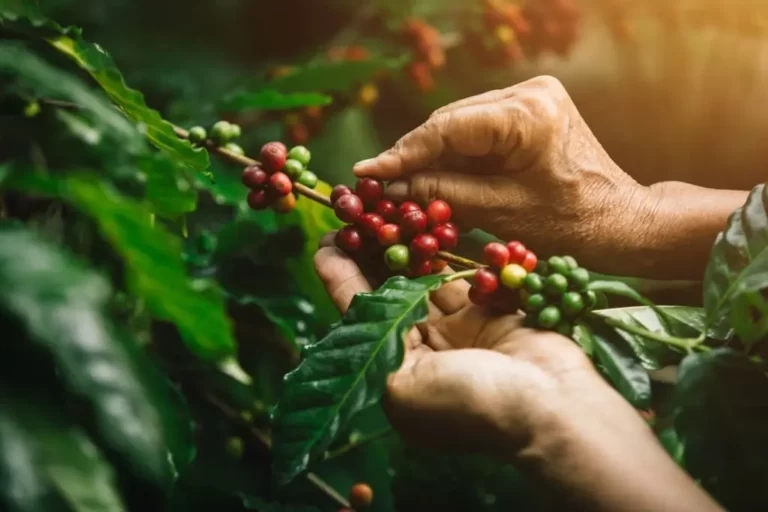Organic coffee has become the recent hype for many coffee lovers looking for a healthier caffeine alternative and vegan coffee enthusiasts. But, it raises the question: “is organic coffee worth it?” Today, we’ll be looking into the question, discussing what makes organic coffee really “organic.”

What Makes Your Cup Of Coffee Organic?
Organic beans must be produced under strict and specific conditions to pass the certification process and be considered organic. But the conditions in question come off as herculean tasks for the coffee farmers.
Coffee farmers had to evolve their production methods to keep up with the rising demand for coffee worldwide. But sadly, doing so negates the welfare of the coffee farmers, the environment, and to an extent, the consumers.
Since chemical farming practices became common, getting organic coffee became harder since it negates the conditions that make coffee organic.
Here are the 3 core steps for any bean coffee to be certified as organic
- The coffee farm has to refrain from using chemical pesticides, inorganic fertilizers, additives, etc.
- The coffee processing plant must have its own organic procedures
- The exporters, importers, and the roasters of the coffee also have to follow the organic methods and comply with them accordingly.
Does It Taste Different? (Is Organic Coffee Worth It?)
The flavor is the first thing any coffee aficionado will consider to judge a coffee. But let me tell you right away, the organic certification doesn’t take away the flavors. In fact, the difference is so little many don’t even notice it.
The bigger factors that influence coffee taste are:
- Growing conditions
- Type of roast
- Storing method
- Bean Variety
It takes the best practices and the utmost care from the coffee producers, importers, and exporters to bring you the coffee that tastes the best.
Coffee taste is subjective. Not everyone likes the way coffee tastes, and what one may taste as nice, others may not. So you may even end up liking organic coffee more than the regular ones on the market. You never know.
3 Ways Organic Coffee Benefits Everyone
Organic coffee production is a humane process that considers every aspect of coffee production and lays out a list of sustainable practices to make it happen.
Remember we were talking about the benefit of the farmers, nature, and the consumers simultaneously? Organic coffee does just that!
It’s Grown without Pesticides, Herbicides, or Fungicides
Would you believe that 97% of the world’s coffee beans are non-organic? These beans are treated with various pesticides, fungicides, or God knows how many other “-cides.”
The worst part is that these things end up in your morning brew to an extent too.

In many developing countries that produce coffee, coffee farms can and will use any chemical they can get their hands on if they find it effective. These countries include Brazil, Colombia, and Indonesia, among many others.
They even use chemicals already banned in many places like America, Europe, Japan, etc., due to their harmful effects on humans.
Organic coffee deals with none of that toxicity, so it’s just as harmless for you as the farmers. Obviously a healthier choice, this one!
Better Soil & Water Quality
Organic farming strains the environment a lot less than conventional coffee farming. But let’s face it, if you weren’t being forced to consume hyperactive liquids while performing with results, you would do better too.

Coffee farmers opt for more sustainable methods for coffee, causing the soil to improve with extra nutrients.
A fine example of the idea is the “shade trees” method. In this method, coffee plants are naturally protected from sunlight with extra foliage.
The shade trees keep the beans from overexposure to sunlight while providing extra nutrients and supplements to the soil. The resulting coffee from the trees growing under the shade trees method are superior in quality.
Shade trees also take away the need for using weird chemicals. It keeps the water and the soil clean and also keeps the ecosystem clean in the process. Shade trees also help reduce carbon dioxide levels.
Now that I think about it, organic coffee is almost making me feel like Captain Planet for supporting it.
Safer for Coffee Growers
Did you know that conventional coffee farming can be harmful to farmers in the long run? It’s a sad fact in today’s world.
A survey in Eastern Jamaica found that most farmers had at least one negative health condition from handling pesticides.
But you don’t have to worry about all that when the coffee in question is organic. A healthy work environment with no toxic material insight makes organic coffee worth it for the coffee farmers and you.

Having fun to read is organic coffee worth it? Check out our piece on tips to avoid caffeine crash.
Health Benefits Of Organic Coffee
Now that we’ve established that organic coffee is the best thing ever for everyone else let’s look at how it helps you. Also, this is the nerd part of the article, so get ready to read a lot of difficult, science-y words.
Your Brain And Body Receive A Boost
Caffeine works as a stimulant, which increases your brain’s cognitive functions. This is the function that helps you focus on studies, drive at night while being on high alert, or get you that sweet mythic loot after a 6-hour raid in WoW.
Cognitive functions slow down over time as you age. But caffeine can help! Old people’s cognitive functions can improve from consuming caffeine regularly. It can also help with cognitive disorders.
Your Diabetes Stays In Control…. Or Doesn’t Happen At All
An interesting property of caffeine is that it suppresses your craving for sweet stuff. It helps you control your diabetes in a weird but wholesome way.
It’s as if your coffee cares for you and wants you not to worsen your condition.

Plus, the nutrients present in coffee can also prevent type 2 diabetes.
You Can Finally Achieve Your Diet Goal
Yes, you can use coffee as the best supplement for your diet. Coffee increases your metabolism rate, helping you burn calories faster.
So next time anyone asks you, just tell them you’re on a coffee diet.
Organic coffee offers you a decent amount of antioxidants and nutrients, keeping you from falling ill less frequently. We have officially reached the point where drinking coffee is better than taking meds.
Say Goodbye To Depression With Organic Coffee
Feeling down lately? Have you considered drinking more organic coffee? It works!
As we mentioned earlier, caffeine works as a stimulant, so it can improve your mood from “I don’t want to move today” to “I should clean the whole house today” pretty easily.
Hey, Check out our piece on best tips for French press users.
Downsides Of Organic Coffee
I hate to talk about negatives about the things that I like and wish to appreciate, but you can’t appreciate something fully without accepting its faults.

Jokes aside, organic coffee does have a few negatives that you should consider before hopping on the hype train.
You Don’t Know The Exact Bean Quality
One of the problems that apply to almost all the organic coffee available in the market is that you can’t tell if the beans are high quality or not.
Just because the beans are grown organically doesn’t mean the quality of the bean is top-notch for consumption. According to the SCA (Specialty Coffee Association), there are three quality categories for coffee:
- Specialty Grade
- Below Speciality Grade
- Premium Grade
To determine the grade of the coffee beans, coffee professionals look into different defects such as:
- Coffee pods
- Unripened beans
- Sour beans
- Broken/ chipped beans
- Unfiltered husks
- Damage by insects
Your Coffee Might Contain Mold and Mycotoxins
Being organic doesn’t shield the coffee from containing bad materials, sadly. The most common cause of this is organic coffee containing mold and mycotoxins. These things grow on coffee beans due to poor storage conditions.
Mold and mycotoxins can cause you several health issues, including:
- Sinus infections
- Memory issues
- Brain fog
- Hair Loss
- Damage to the DNA structure
- Liver Issues
- Kidney Issues
- Alzheimer’s
- Parkinson’s disease
- Neuromuscular diseases
- Different forms of heart disease
- Cancer
Organic Coffee Can Be Improperly Roasted
Even when you’ve made sure that your coffee is free of fertilizer and other weird chemicals, you still can’t make sure that your coffee has been roasted properly.
Many coffee roasters save time by roasting all of their beans in one go at a really high temperature. Doing so can create highly toxic roasting byproducts like acrylamide and HCAs. These things can absolutely wreck your nerves and even can give you cancer.
The right way to keep organic coffee healthy while roasting is to roast it in multiple small batches with a smokeless machine. That way, you have fewer chances of burning your coffee and making it undrinkable, as well as ensuring the toxicity from your coffee is gone.
There’s No Requirement that Organic Coffee is Lab Tested
Though organic coffee production doesn’t use any form of pesticides, there can be many other harmful contents present in the coffee that you can’t tell cause it’s not tested.
Organic coffee doesn’t have a lab-testing requirement by the SCA, so sometimes harmful elements can sneak past everything and reach your morning cup.
Is Buying Organic Coffee Just “The Right Thing To Do”? (Is Organic Coffee Worth It?)
The best answer to this question is

You might think the cost of organic coffee is a bit too much. But if you consider the amount of money you are saving in terms of healthcare, you see the point.
Plus, you’re helping the farmers and the environment as well. The good of organic coffee outweighs the bad while turning into long-term savings.
Organic coffee isn’t always going to be on the high price mantle. Farmers are getting more and more efficient in organic coffee farming, which is cutting down the manufacturing cost and increasing organic coffee production. Fair trade practices ensure that the farmers are getting their due as well.
Organic coffee conquers 3% of the entire coffee market and 33% of organic beverage sales in the current market. But this is a number that’s bound to go up soon.
So if you’re a regular coffee drinker, switching to organic coffee is a great decision you can make. And if you’re already a fan of organic coffee, then you’ve already made a pretty great choice.
Had fun reading is organic coffee worth it? You’ll love to read why coffee plants produce caffeine.
Bottom Line
Organic coffee is the saving grace of the coffee industry that’s entertaining the taste buds of coffee lovers worldwide while keeping the whole thing eco-friendly. We hope you have a great experience with your new organic coffee lifestyle.
Cheers!
FAQs
Buying organic coffee helps you support the great cause of sustaining the environment and preserving the coffee farmers’ safety rights. At the same time, you can enjoy quality coffee from the comfort of your home.
In terms of price, organic coffee costs slightly more than conventional coffee available in the market.
Organic coffee is grown without using any form of artificial chemicals or additives. This method helps the coffee retain most of its natural health properties.
The lack of artificial pesticides, processing chemicals and additives, a high presence of helpful antioxidants and natural minerals, and a rich taste is what makes organic coffee “organic.”
Since organic coffee costs more than regular coffee, much stick to regular coffee. Organic coffee, especially specialty coffee, is considered a luxury many can’t afford.

